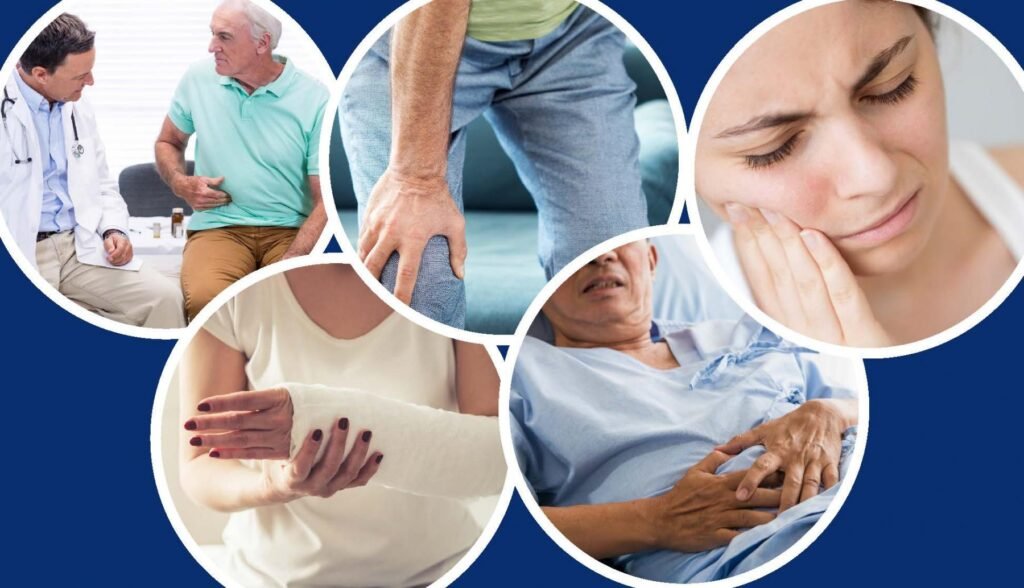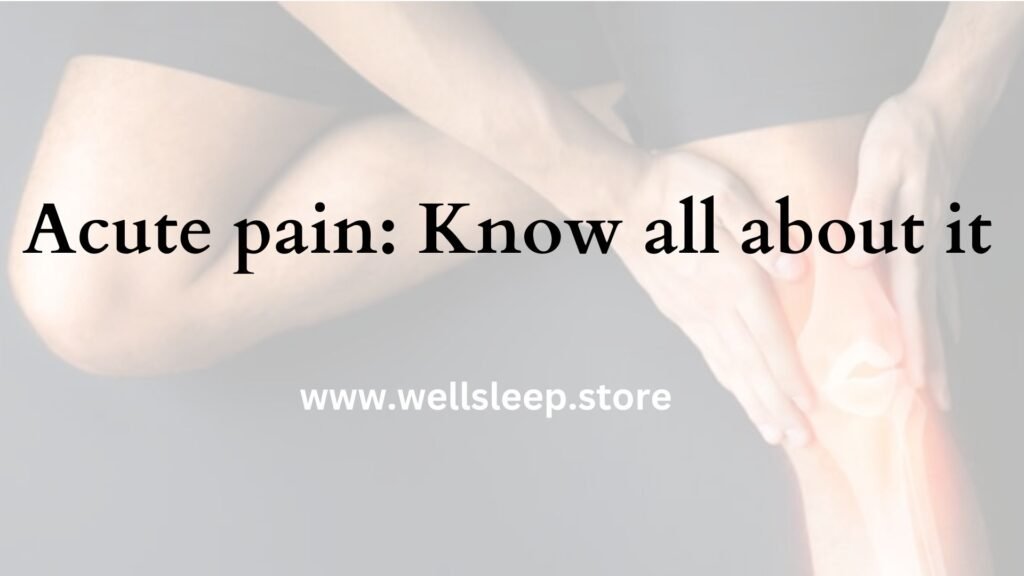“12 Signs Your Acute Pain Requires Immediate Medical Attention”
Acute pain is the body’s natural reaction to an injury, disease, or infection. Acute pain is usually sudden in onset and may be sharp or stabbing in nature. It may be the result of a sprain or kidney stone or any other condition. It is more of a warning system that calls for attention. Conversely, not all acute pain is the same, and you must distinguish between pain that can be managed at home and pain that needs immediate medical intervention.
While some acute pain can be alleviated with rest, ice, or over-the-counter medication, other instances may indicate a more serious underlying problem. Recognizing when pain may signal an emergency is vital in preventing long-term damage, complications, or even life-threatening situations. In some cases, what begins as manageable pain can rapidly escalate into a medical emergency if left untreated.
Certain signs and symptoms should never be ignored when experiencing acute pain. If the pain is severe, persistent, or accompanied by other warning signs it may indicate a critical condition that needs urgent care. Knowing when your body is sending an SOS signal is key to ensuring your health and safety.
It shall explore 12 critical signs which may indicate the need for emergency medical attention. Once you are aware of these warning signs, you’ll be able to take action at the right moment in order to make sure that proper care is sought before things become too late. So, let’s dive into those key indicators.
What is Acute Pain?
Acute pain is a type of pain that normally occurs suddenly, and it often relates to some form of injury or medical condition. Unlike chronic pain, which remains for a longer period, It is like a warning that something is wrong in the body. It generally lasts for a few hours to weeks and usually goes away once the cause is treated or healed.
It is there to protect the body from further injury. For instance, when you cut your finger, the sharp pain it brings reminds you to avoid using the injured area and seek medical attention if necessary. Similarly, if you sprain an ankle, the pain is your body’s way of indicating that rest and care are required to promote healing.
Causes of Acute Pain
Acute pain can result from a variety of factors, including:
1. Injury – Cuts, burns, fractures, and sprains are common causes of It. In these cases, the injury often causes pain that is localized to the affected area and can be severe.
2.Surgery – Post-surgical pain is a typical example of acute pain. This discomfort usually subsides as the body heals.
3.Illness or Infection – It can also cause acute pain, as seen in medical conditions like kidney stones, gallstones, or infections such as appendicitis.
4.Inflammation – Conditions like a sore throat, arthritis, or muscle strain can cause acute pain due to inflammation in the affected area.

12 Signs Your Acute Pain needs Medical Attention: Know more
Here are 12 signs that your pain may require immediate medical attention:
1. Pain Following Severe Trauma
If your pain is a result of some form of major trauma—whether it’s falling, car crash, or an athletics-related accident-you should seek attention immediately. Profound pain is often indicative of broken bones or internal injuries to or damage to sensitive organs. The injury may look minor, and you might simply want to let it heal by itself. On the other hand, be conservative.
2. Pain With Associated Numbness or Weakness
If such acute pain is accompanied by numbness, tingling, or weakness in any area of the body, it could indicate nerve damage or something that might be neurological in origin, like a herniated disc or even a stroke. Seek proper treatment as soon as possible to avoid permanent damage.
3. Difficulty Breathing or Chest Pain
Pain in your chest, especially sharp or accompanied by shortness of breath, may signal a heart attack, pulmonary embolism, or other dangerous heart or lung conditions. That is an emergency that needs urgent medical attention.
4. Severe Abdominal Pain
Intense abdominal pain, especially when combined with nausea, vomiting, or fever, could indicate serious conditions such as appendicitis, gallstones, or a bowel obstruction. If you’re experiencing severe abdominal pain, it’s important to seek help immediately.
5. Pain That Doesn’t Improve with Rest or Medication
If your pain persists despite taking over-the-counter medications and resting, it might be a sign that the underlying cause is more severe than initially thought. A healthcare professional should evaluate chronic pain or pain that worsens.
6. Fever with Acute Pain
When acute pain combines with fever, it might present an infection that could be sepsis, pneumonia, or even meningitis: all dangerous diseases if left alone. Seek the doctor’s service immediately if pain is accompanied with fever.
7. Unusual Headaches
Any headaches that come suddenly and feel not like your previous headaches, but especially those ones accompanied by nausea, vomiting, dizziness, or vision, may be warning you of a bigger problem, which could be related to a stroke, aneurysm, or tumor in the brain. Get some medical attention straight away if it happens.
8. Pain along with Uncommon Bleeding or Discharge
Acute pain coupled with abnormal bleeding from the skin, nose, mouth, or internally can indicate a medical emergency. The following are conditions that may present these symptoms: a ruptured blood vessel, internal hemorrhaging, and an ectopic pregnancy.
9. Pain That Gets Worse With Time
If your pain is gradually getting worse despite using different pain control methods, it may be a sign that the underlying cause is worsening. For instance, infections, fractures, or inflammation can worsen rapidly if not treated promptly. Early treatment can help solve the problem before it becomes critical.
10. Pain with Confusion or Loss of Consciousness
If acute pain is accompanied by confusion, dizziness, or even fainting, it may be a sign of a neurological or cardiovascular event. In this scenario, urgent action is required to prevent further complications.
11. Sudden Back Pain with Leg Weakness
Pain that radiates down the legs and is associated with lower back pain; symptoms such as loss of strength or bowel and bladder control indicate a serious condition like cauda equina syndrome, which needs immediate surgery to prevent long-term disability.
12. Pain not responsive to treatment
If your acute pain is not relieved by standard treatments like over-the-counter painkillers or rest, it could be a sign of a deeper issue, such as a fracture, an abscess, or a serious underlying disease. If the pain continues to persist or intensify, you should seek medical attention to rule out any life-threatening conditions.
How Benzodiazepines Help in the Treatment
Doctors primarily use this class of medicines for anxiety, muscle relaxation, and some sleep disorders, and they also use it to manage acute pain due to its mechanism of action. These are not painkillers but doctors prescribe them in situations where muscle spasms, anxiety, or sleep disturbances interfere with the pain. For example, in the presence of muscle spasm or musculoskeletal trauma that leads to severe muscle spasm, the benzodiazepines assist in relaxing muscles and thus reduce the pain caused by spasm. This can be very beneficial when muscle spasms have exacerbated the patient’s pain.
Furthermore, anxiety and tension increase the perceived pain, hence increasing the degree of pain severity. Benzodiazepines have anxiolytic effects, which help to reduce anxiety, thus alleviating some of the emotional stress associated with acute pain. This would lead to an improved pain experience since anxiety usually exacerbates discomfort, especially in cases of trauma or surgery. Additionally, acute pain often disrupts sleep, and benzodiazepines, with their sedative properties, can aid in improving sleep quality. These drugs facilitate the patient in getting adequate rest, which is essential for recovery.
Benzodiazepines help manage acute pain in the short term, but doctors do not use them alone. They often combine benzodiazepines with other treatments like NSAIDs or physical therapy for more effective pain relief. Since prolonged use can lead to dependency or other complications, doctors prescribe benzodiazepines for limited durations. Medical professionals must monitor their use closely, especially in patients taking multiple medications or those with a history of substance use disorders.
. They are only a temporary adjuvant to pain management by reducing the spasm, anxiety, and sleep associated with acute pain.

Conclusion
In conclusion, while acute pain is often a natural response to injury or illness, it’s crucial to recognize when it signals something more serious. The 12 signs discussed highlight when your acute pain may require immediate medical attention to prevent further complications and ensure proper treatment. Whether it’s accompanied by symptoms like difficulty breathing, numbness, or worsening pain, timely intervention can make a significant difference in your recovery. Always listen to your body, and don’t hesitate to seek professional care if your acute pain is severe, persistent, or linked with other warning signs. Your health and well-being should always come first.

